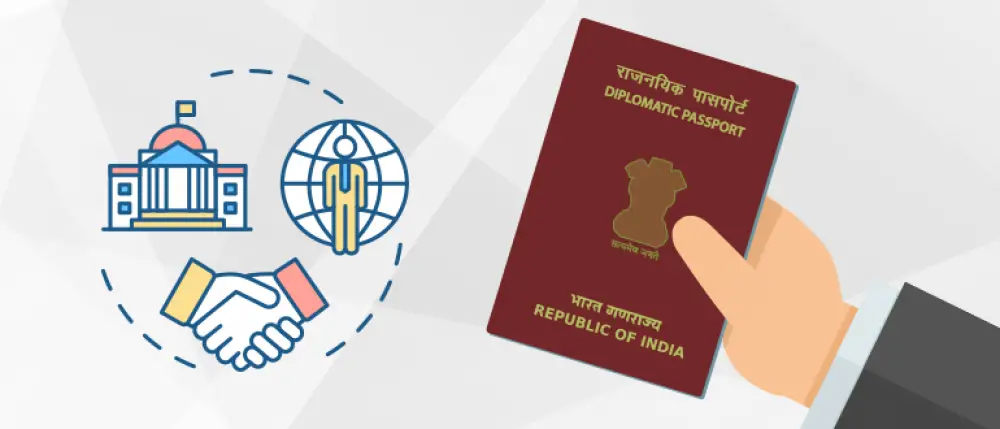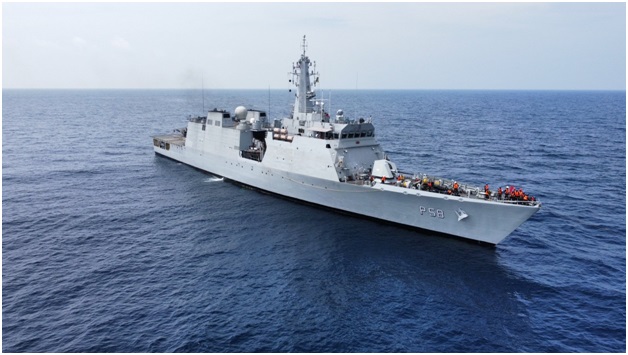BM-04 Missile
- 12 Apr 2025
In News:
India recently introduced the BM-04, a new-generation Short-Range Ballistic Missile (SRBM), during the Vigyan Vaibhav 2025 defence exhibition in Hyderabad. Developed by the Defence Research and Development Organisation (DRDO), the missile underscores India’s commitment to enhancing its conventional precision strike and counterforce capabilities.
Key Specifications and Features:
- Length: 10.2 metres
- Diameter: 1.2 metres
- Weight: Approximately 11,500 kg
- Propulsion: Dual-stage, solid-fuel system
- Range: Capable of striking targets up to 1,500 km away
- Warhead: Equipped with a 500 kg conventional payload
- Accuracy: Features a 30-metre Circular Error Probability (CEP)
Advanced Capabilities:
- Canisterized Launch System: Like other strategic missiles in India’s arsenal, the BM-04 is canisterized, enabling quicker launch readiness by pre-mating the warhead and delivery system.
- Mobile Deployment: Transported and launched via an indigenous six-wheeled Transport Erector Launcher (TEL), offering enhanced mobility and operational flexibility.
- Hypersonic Glide Body (C-HGB): The missile incorporates a Common Hypersonic Glide Body, allowing it to maneuver mid-flight, making its trajectory less predictable and improving its ability to evade missile defence systems, particularly in contested A2/AD environments.
- Modular Design: The BM-04 platform is designed for upgradability, supporting integration of advanced warheads, sensors, and propulsion technologies as threat perceptions evolve.
Strategic Significance:The induction of the BM-04 marks a leap in India’s tactical missile capability, bolstering its credible conventional deterrence posture. With precision targeting, improved survivability, and adaptability for future upgrades, the BM-04 is poised to play a vital role in India’s defence architecture.
Diplomatic Passport

- 03 May 2024
Why is it in the News?
After allegations of sexual abuse by Janata Dal (Secular) MP Prajwal Revanna came to light, the politician fled to Germany on a diplomatic passport.
What is a Diplomatic Passport?
- Diplomatic passports are issued to people holding diplomatic status or deputed by the Government of India for official duty abroad.
- Unlike normal passports, which are valid for 10 years and have a dark blue cover, diplomatic passports are valid for five years or less and have maroon covers.
- Diplomatic passports, also known as 'Type D' passports.
- A diplomatic passport has 28 pages.
- Holders of such passports are entitled to certain privileges and immunities as per international law, including immunity from arrest, detention, and certain legal proceedings in the host country.
Issuing Authority:
- The Ministry of External Affairs’s (MEA) Consular, Passport & Visa Division issues diplomatic passports (‘Type D’ passports) to people falling in broadly five categories:
- Those with diplomatic status;
- Government-appointed individuals travelling abroad for official business;
- Officers working under the branches A and B of the Indian Foreign Service (IFS), normally at the rank of Joint Secretary and above; and
- Relatives and immediate family of officers employed in IFS and MEA.
- Select individuals who are authorised to undertake official travel on behalf of the government”.
- The MEA issues visa notes to government officials going abroad for an official assignment or visit.
What are the Benefits of Having a Diplomatic Passport?
- Official identification: The diplomatic passport serves as an official identification document for individuals representing the Indian government on diplomatic missions.
- It helps in establishing their identity and official status.
- Diplomatic immunity: Diplomatic passport holders are typically entitled to certain privileges and immunities as per international law.
- This includes immunity from arrest, detention, and certain legal proceedings in the host country, safeguarding their ability to perform official duties without hindrance.
- Visa facilitation: Diplomatic passports often enjoy certain privileges when it comes to visa facilitation.
- Many countries offer expedited visa processing or waive visa requirements altogether for diplomatic passport holders, simplifying travel arrangements for official purposes.
- Access to diplomatic channels: The diplomatic passport grants access to diplomatic channels and services provided by Indian embassies, consulates, and other diplomatic missions worldwide.
- This includes assistance with consular services, protection, and support while abroad.
- Priority services: Diplomatic passport holders may receive priority services at airports and during immigration procedures.
- This can include dedicated immigration counters or expedited security and customs clearance, saving time during travel.
- Official representation: The diplomatic passport signifies the official representation of the Indian government and confers a sense of authority and credibility while dealing with international counterparts, foreign officials, and diplomatic communities.
Can Diplomatic Passports be Revoked?
- According to The Passports Act, 1967, the passport authority may cancel a passport or travel document, with the previous approval of the Central government.
- The passport authority can impound or revoke a passport if the authority believes that:
- The passport holder or travel document is in wrongful possession
- If the passport was obtained by the suppression of material information or based on wrong information provided by the individual
- If it is brought to the notice of the passport authority that the individual has been issued a court order prohibiting his departure from India or has been summoned by the court.
- A diplomatic passport can be revoked upon orders from a court during proceedings with respect to an offence allegedly carried out by the passport holder before a criminal court.
INS Sumedha (Financial Express)

- 15 Nov 2023
Why in the News?
In a strategic move as part of the Indian Navy’s mission-based deployment to West Africa and the Atlantic, INS Sumedha conducted a port call at Walvis Bay, Namibia recently.
About INS Sumedha:
- INS Sumedha is a Saryu-class, Naval Offshore Patrol Vessel (NOPV) of the Indian Navy.
- It is the third ship of the class to be commissioned and was built by Goa Shipyard Limited in India.
- The ship was commissioned in March 2014.
- INS Sumedha is designed to undertake a variety of missions, including fleet support operations, coastal and offshore patrolling, ocean surveillance, and monitoring of sea lines of communication and offshore assets.
- The ship is also capable of carrying out humanitarian assistance and disaster relief (HADR) operations.
- INS Sumedha has been deployed on a number of operational missions, including:
- Operation Kaveri, the evacuation of Indian citizens from Sudan in April 2023.
- The ship has also participated in a number of international exercises, including Exercise Bright Star 2023 in Egypt.
About Walvis Bay:
- Walvis Bay is a city on the coast of Namibia, in the Erongo Region.
- It is the second-largest city in Namibia, after Windhoek, and is the capital of the Erongo Region.
- It is a major port city, and is the main port for Namibia.
- The port is home to a number of shipping companies and is a major export center for Namibian goods, such as fish, minerals, and diamonds.
- Originally a German enclave during the colonial era, Walvis Bay became a vital part of Namibia after gaining independence in 1990.
- The official language of the city is English, but Afrikaans, German, and Portuguese are also spoken.
